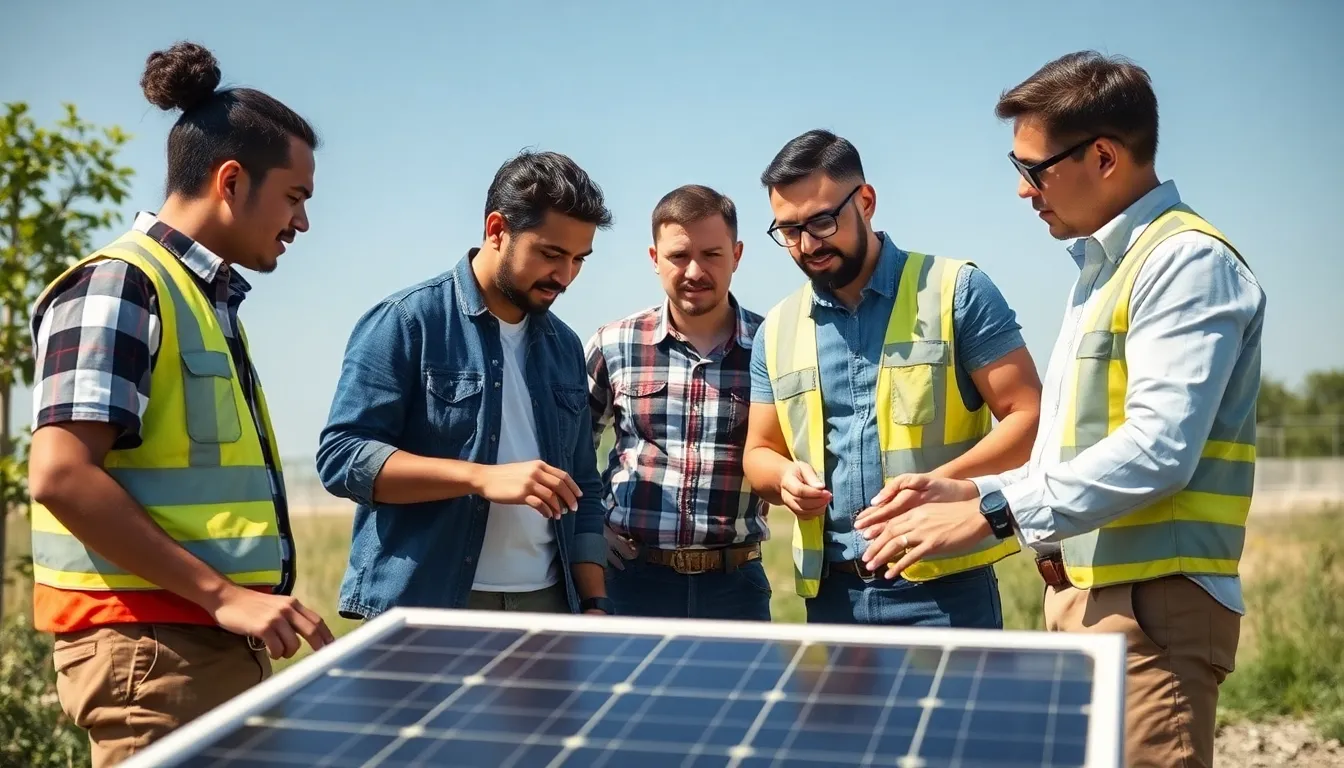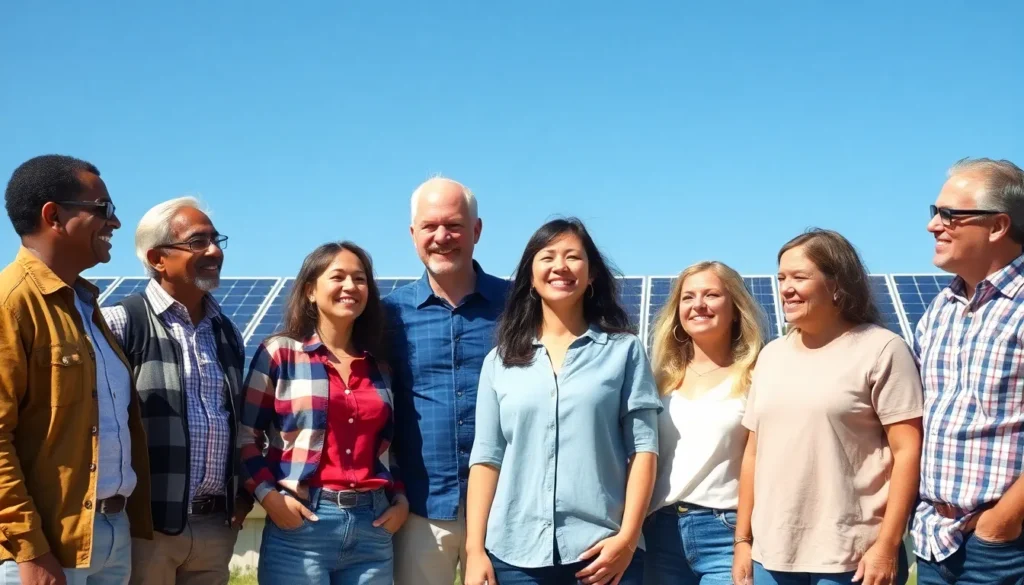Table of Contents
ToggleIn a world where pollution seems to have taken the front seat, clean tech is the superhero we didn’t know we needed. Imagine a future where energy is renewable, and the air is as fresh as a spring morning. Clean technology isn’t just a buzzword; it’s the key to saving our planet while keeping our gadgets running smoothly.
Overview of Clean Tech
Clean tech represents a collection of innovations aimed at reducing environmental impact and enhancing sustainability. It encompasses renewable energy sources like solar, wind, and hydropower, which offer alternatives to fossil fuels. Beyond energy production, clean tech also includes advancements in energy efficiency, such as smart grids and energy storage solutions.
Innovations in clean transportation also play a vital role. Electric vehicles, hydrogen-powered vehicles, and public transit systems reduce greenhouse gas emissions while improving urban air quality. Adoption of these technologies promotes sustainable city living and encourages users to shift away from traditional gasoline-powered cars.
Water purification solutions represent another crucial area. Technologies that treat wastewater and enhance water conservation can significantly address global water scarcity challenges. Efficient irrigation systems in agriculture can further promote sustainability by minimizing water usage.
Telecommunications also benefit from clean tech strategies. Infrastructure designed with energy efficiency in mind ensures lower energy consumption for data centers and network operations. Blockchain technology can contribute to better resource management, improving transparency in environmental practices.
Government policies and private investments increasingly support clean tech initiatives. Research and development funding boosts innovation, while tax incentives encourage modifications to existing infrastructures. Market growth for clean technologies fosters economic opportunities across various sectors.
Public awareness and education fuel the demand for clean tech. As individuals understand the environmental benefits, preferences shift toward sustainable products and practices. Increased consumer demand helps drive the clean tech market toward greater advancements and capabilities.
Key Technologies in Clean Tech

Clean tech encompasses various advanced technologies that contribute to environmental sustainability. Key areas of focus include renewable energy solutions and energy efficiency innovations.
Renewable Energy Solutions
Solar energy systems harness sunlight to generate electricity and heat. Wind turbines convert kinetic energy from wind into mechanical power, while hydropower utilizes moving water to produce energy. Biomass energy, derived from organic materials, also plays a significant role in clean energy generation. Geothermal systems exploit heat from the Earth’s core for efficient heating and electricity production. These renewable sources not only reduce dependency on fossil fuels but also minimize greenhouse gas emissions.
Energy Efficiency Innovations
Smart grids enhance the efficiency of electricity distribution by incorporating digital technology. Energy storage solutions, such as lithium-ion batteries, allow for effective energy management and utilization. LED lighting significantly lowers energy consumption compared to traditional bulbs. High-efficiency appliances promote reduced energy usage in households and businesses. Intentional urban planning integrates energy-efficient designs into infrastructure, contributing to lower overall energy needs. Each of these innovations aims to optimize energy use and support a sustainable future.
Impact of Clean Tech on the Environment
Clean technology profoundly affects the environment by reducing pollution and fostering sustainability. Innovations in this field lead to significant changes in how energy is produced and consumed.
Reduction of Carbon Footprint
Clean tech plays a crucial role in lowering carbon footprints across various sectors. Renewable energy sources, such as solar and wind, reduce reliance on fossil fuels, which are primary contributors to greenhouse gases. Transitioning to electric vehicles decreases emissions from traditional transportation methods. According to the International Energy Agency, the global carbon dioxide emissions from the energy sector dropped by 2% in 2019, largely due to clean technology adoption. Utilizing energy-efficient appliances minimizes overall electricity consumption, directly contributing to lower carbon output. By investing in smart technologies like automated energy management systems, communities can further decrease their carbon footprints.
Promoting Sustainable Practices
Clean technology encourages sustainable practices in multiple industries. For instance, industries are adopting waste-to-energy strategies that convert waste into usable fuel, diverting material from landfills. Implementing efficient irrigation systems optimizes water use for agriculture, supporting both crop yields and resource preservation. Moreover, innovations in water purification enable safe drinking water access, even in areas facing shortages. These sustainable practices not only reduce environmental impact but also align with global goals for resource conservation. Education programs raise awareness about clean tech, empowering individuals to adopt sustainable habits in their daily lives, further reinforcing its impact on the environment.
Challenges Facing Clean Tech Adoption
Clean technology adoption faces various challenges that hinder its widespread implementation. Key issues include economic barriers and regulatory hurdles.
Economic Barriers
Financial constraints limit the growth of clean tech. High initial costs associated with renewable energy systems deter many investors. Small businesses struggle to access funding for clean technology initiatives. Lack of competitive pricing compared to fossil fuels also hampers market entry for clean alternatives. Transitioning existing infrastructure requires substantial investment, which may not present immediate returns. Additionally, the economic climate influences investor confidence in clean tech projects. Access to resources is often unequal, creating disparities in clean tech adoption across regions.
Regulatory Hurdles
Regulatory frameworks can complicate clean tech implementation. Inconsistent policies among governments create uncertainty for investors and developers. Complicated permitting processes often delay project timelines. Compliance with varying environmental regulations can increase operational costs for clean tech companies. Limited incentives for transitioning to sustainable practices reduce motivation for businesses. Ambiguous regulations around emerging technologies, like energy storage, create confusion in the market. Navigating these rules can prove daunting, leading to hesitation in adopting new technologies.
Future of Clean Tech
Clean technology continues to evolve at a rapid pace, shaping a sustainable future. Innovations emerge regularly, reflecting advancements across various sectors.
Emerging Trends
Innovative solutions drive the clean tech landscape. Hydrogen fuel development progresses, with applications in transportation and energy storage. Carbon capture technologies gain traction, helping reduce greenhouse gas emissions from industrial processes. Battery recycling initiatives support sustainable energy, addressing the growing demand for electric vehicles. Smart city initiatives leverage data to optimize energy consumption in urban environments. Energy-as-a-Service models offer tailored solutions, enabling companies to access clean energy without significant upfront investments. These trends highlight the dynamic nature of clean tech, responding to global challenges and fostering sustainability.
Potential for Growth
The clean tech sector shows immense potential for expansion. By 2030, the global renewable energy market could reach $1.5 trillion. Increased investment in electric vehicles and energy storage technologies will fuel market growth. Governments may prioritize sustainable initiatives, incentivizing clean tech adoption. Jobs in green energy sectors are expected to climb, creating millions of roles worldwide. Advances in waste management technologies will likely enhance resource efficiency. Public demand for eco-friendly products drives innovation and market expansion. Significant opportunities exist for businesses focused on sustainability, ensuring clean tech’s pivotal role in future economies.
Clean technology stands at the forefront of the movement toward a sustainable future. Its innovations are not only crucial for reducing pollution but also for enhancing the efficiency of modern life. As society increasingly embraces renewable energy and energy-efficient solutions, the potential for positive environmental impact grows.
The ongoing evolution of clean tech promises exciting advancements that can reshape industries and improve quality of life. With continued investment and support from both the public and private sectors, clean technology can drive the transition to a greener economy. By prioritizing these solutions, society can work towards a healthier planet and a more sustainable way of living for future generations.







